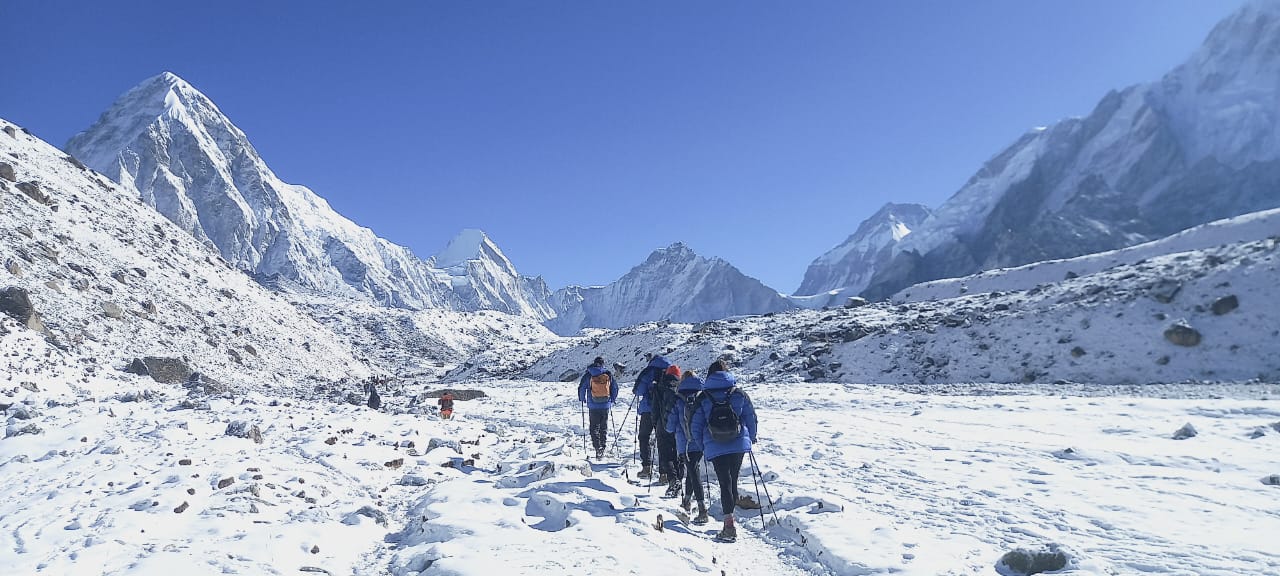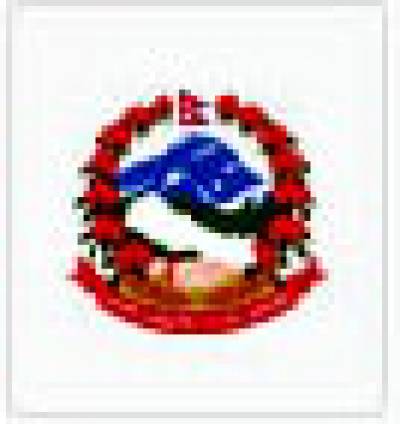MERA AND ISLAND PEAK CLIMBING
Embark on a thrilling mountaineering adventure like no other with the Mera and Island Peak Climbing expedition crafted by We Sherpa Expedition and Trekking. This exclusive package is designed for adventure enthusiasts seeking a unique and challenging experience in the heart of the Himalayas, combining the exhilarating ascents of two iconic peaks – Mera Peak and Island Peak.
The expedition kicks off with the conquest of Mera Peak, the highest trekking peak in Nepal towering at an impressive altitude of 6,476 meters. As you traverse through enchanting landscapes of lush forests, remote villages, and rugged mountain terrain, our seasoned guides from We Sherpa Expedition and Trekking will be by your side, providing expert guidance and unwavering support throughout the journey. The climb to the summit of Mera Peak presents a blend of technical climbing and high-altitude trekking, culminating in a mesmerizing panorama of the majestic Himalayan range, with views of Everest, Lhotse, and Makalu that will leave you spellbound.
Following the triumphant ascent of Mera Peak, the expedition transitions to the challenge of scaling Island Peak, also known as Imja Tse, a prominent peak standing tall at 6,189 meters. This demanding climb demands a good level of physical fitness and mountaineering expertise, offering a thrilling yet rewarding experience. From the summit of Island Peak, you will be treated to awe-inspiring vistas of iconic peaks such as Ama Dablam and Nuptse, immersing you in the grandeur and magnificence of the Himalayan landscape.
Throughout the expedition, We Sherpa Expedition and Trekking will provide comprehensive logistical support, including transportation, accommodation, meals, and top-quality equipment. Our team of experienced guides and Sherpa climbers possess intimate knowledge of the region, ensuring a safe and successful climb while allowing you to focus on the adventure and savor the unparalleled beauty of the Himalayas.
Embark on the Mera and Island Peak Climbing expedition with We Sherpa Expedition and Trekking for an unforgettable journey filled with challenges, triumphs, and unforgettable memories in the breathtaking Himalayan wilderness. Join us on this extraordinary adventure and discover the thrill of conquering two legendary peaks in the Everest region.
ITINERARY
Day 1 : Arrival at Kathmandu Airport [1345m/4411ft] & transfer to hotel.
Our representative will meet you at Tribhuwan International Airport. You will then be transferred to your hotel in Kathmandu city. Our staff will assist you until the check-in procedure ends at the hotel. You can either rest at the hotel or visit our office for additional information about the trip.
Day 2 : Fly from Kathmandu to Lukla and trek to Chhutang [2800m/9184ft] Duration: 3- 5 hours.
Today, we will take an early morning scenic flight from Kathmandu to the airstrip in Lukla. Lukla is the gateway to Khumbu and the entire Everest region. From Lukla, we start our trek heading east into the thick forest on the hillside below the Kalo Himal Ridge. There are several trails that head away from the main trail on this section, so sticking to the group is the best option before arriving at Chhutang.
Day 3 : Trek from Chhuthang to Tuli Kharka [4100m/13448ft] Duration: 5-6 hours.
Leaving Chhutang we will follow the trail that gradually ascends and steepens as we head towards the crossing of Zatrawala Pass at 4600 meters. Our tiring climb to the top of the pass is rewarded with magnificent views of Numbur Himal, Kongdi Ri, Karyolang Peak and other surrounding peaks. Our trek goes along a level path for almost two hours before descending all the way to Tuli Kharka.
Day 4 : Trek from Tuli Kharka to Kothe [3580 m | 11,745 ft] Duration: 6-7 hours.
From Tuli Kharka, our trail is a mixture of both uphill and downhill trekking through dense forest filled with rhododendron, oak, pine and juniper trees. During our trek, we will have magnificent views of Mera Peak and surrounding snow-capped peaks. A steep descent to the Hinku River and a final uphill climb will lead us to Kothe. Kothe lies to the west side of the Hinku valley and offers serene wilderness with lush vegetation to trekkers.
Day 5 : Trek from Kothe to Thangnak [4326m/14189ft] Duration: 4-5 hours.
Our trail from Kothe goes along the ridge of the Hinku river towards Gondishung. We will pass through Lungsumgba Gompa which was built approximately 200 years ago. Here we can find Mera Peak along with its route scripted in rock, a fantastic example of rock carving architecture. Our trek continues along a rather easy walking trail that leads to the summer grazing area of Thangnak where there are shops and tea houses.
Day 6 : Trek from Thangnak to Khare [5000m/16400ft] Duration: 3 hours.
Our trail from Thangnak goes over the lateral moraine towards Hinku Nup and Shar Glaciers. From there, the trek involves a steep climb all the way to Khare. We will enjoy the magnificent view of the Northern Face of Mera Peak from Khare. Besides, Khare offers a number of good hikes for exploration and acclimatization.
Day 7 : Acclimatization day at Khare.
Acclimatization is essential in higher altitudes to avoid mental and physical sickness. As we are above the 5000 meters altitude, we will spend a rest day at Khare for acclimatization and exploration. Our Sherpa team will make necessary checks on our climbing gears including ropes, ice axes, crampons, harness, and other equipment before heading further to higher camps.
Day 8 : Trek to Mera High Camp [5700m/18696ft] Duration: 3-4 hours.
Leaving the Mera High camp, we will follow the trail that climbs over through Mera La Pass and continue trekking along the rocky and often snow-covered trail towards Mera Peak High Camp. Once at the high camp, our Sherpa crew will quickly set up the camps and make necessary checks on our health conditions and climbing gears. From the high camp, we can enjoy amazing views of Everest, Makalu, Nuptse, Cho Oyu, Baruntse, and Chamlang.
Day 9 : Summit Mera Peak (6,461m/21,190ft), trek to Kongma Dingma (4,850m/15912ft) Duration:10-11 hours.
Today is going to be a long and tiring one as we head to the summit. We will have some amazing views of Mt. Everest, Makalu, and Cho Oyu, Nuptse, Chamlang, and Baruntse. The views from the summit go on forever! After some time at the summit we retrace our foot-steps back to high camp where we rest for a while before descending to Kongma Dingma for the night.
Day 10 : Kongma Dingma: rest day.
Today is a well-deserved rest day after yesterday’s mammoth effort to reach the summit.
Day 11 : Trek from Kongma Dingma to Seto Pokhari (5035m/16519 ft) Duration: 5-6 hours.
This morning we head up a remote valley to the yak pastures further up. As we trek we have Chamlang on our left, and Baruntse in the distance. We continue up the valley in the direction of Mt. Everest and Lhotse. We will camp overnight at Seto Pokhari.
Day 12 : Trek From Seto Pokhari to Amphu Labcha Base Camp (South) (5,650m/18,536 ft) Duration: 5-6 hours
This is one of the most remote regions of the Himalayas, so it is rare that we see any trekkers on the trail unless it is in the peak tourist season. From Seto Pokhari we pass several lakes in the upper Hunku Basin. After passing Hunku Pokhari we come to Hunku Glacier. Tonight we will stay at Labtsa Base Camp.
Day 13 : Amphu Labcha Base Camp to Chhukung (4,750m/15,580 ft) Duration: 9-10 hours.
Today we cross the Amphu Labtsa La Pass (5,845m) then cross the Amphu Labtsa Glacier. Lhotse Shar Glacier and Imja Glacier are very close. The trail then heads around Imja Tsho Lake and then follows the main Island Peak trail. As we continue we come close to Ama Dablam Glacier before arriving at Chhukung where we stay overnight.
Day 14 : Trek to Island Peak base camp (5,200m/17,060ft) Duration: 4-5 hours.
Although Island peak does not require technical expertise, it does however require strength and stamina. It does however require some basic skills and how to avoid mishaps. It is essential that we reach the summit before lunch, as in the afternoon it can be extremely windy. The path climbs hundreds of meters from the bottom camp before facing a sharp incline initially on a sandy trail before turning to grass, and finally over boulders. The path eventually narrows before entering a steep rock vale (narrow channel of rock). We finally, after many steps across and through the vale emerge on the other side Your guide, for safety reasons, may fix a rope to each climber to assist in climbing the final snowy slope to the ridge at the summit. The rope may often extend to 350m depending on the season and danger of crevices. Some of these crevices may be 2 to 3 meters across requiring the use of ladders. Once at the summit it is time to take out your camera and capture the magnificent views and get your breath back!. We will then descent to Island Peak Base Camp, and with your guides, will celebrate our success. Meals - breakfast, lunch & dinner.
Day 15 : Island Peak base Camp to Summit Island Peak summit (6,189m/20,305ft), back to Chhukung Duration: 10-12 hours.
Although Island peak does not require technical expertise, it does however require strength and stamina. It does however require some basic skills and how to avoid mishaps. It is essential that we reach the summit before lunch, as in the afternoon it can be extremely windy. The path climbs hundreds of meters from the bottom camp before facing a sharp incline initially on a sandy trail before turning to grass, and finally over boulders. The path eventually narrows before entering a steep rock vale (narrow channel of rock). We finally, after many steps across and through the vale emerge on the other side Your guide, for safety reasons, may fix a rope to each climber to assist in climbing the final snowy slope to the ridge at the summit. The rope may often extend to 350m depending on the season and danger of crevices. Some of these crevices may be 2 to 3 meters across requiring the use of ladders. Once at the summit it is time to take out your camera and capture the magnificent views and get your breath back!. We will then descent to Chhukung, and with your guides, will celebrate our success.
Day 16 : Trek from Chhukung to Namche Bazaar (3,440m/11,286ft) Duration: 6-7 hours.
Leaving Chhukung we return on the same path to Imja Khola heading up through the forest to Tengboche. If there is enough interest we can visit the nuns at their Tengboche residence. After lunch at Tengboche we descend along a path surrounded by alpine bush and juniper trees. After crossing the bridge over the Dudh Koshi watercourse, our path takes us to Dudh Koshi Gorge taking us through pine forests before finally reaching Sansa. On the way down we should keep our eyes peeled for glimpses of mountain goats, snow leopards, colorful pheasants, and other wildlife. After emerging from the forest we pass through Chorten before reaching the military camp at Namche Bazaar. Tonight we stay at Namche Bazaar.
Day 17 : Trek from Namche Bazaar to Lukla (2,800m/9,186ft) Duration: 6-7 hours.
The rocky path down is steep and it is advised to be cautious crossing this rocky landscape. We eventually cross the suspension bridges over the rapid flowing Dudh Koshi and its tributaries, where the path becomes flatter and easier to negotiate. After our arrival in Lukla we can stretch our aching legs and blissfully recall the exhilarating experiences of the last few weeks. Meals - breakfast, lunch & dinner.
Day 18 : Fly back to Kathmandu (1,350m/4,428ft).
Today we take a morning flight to Kathmandu. In Kathmandu, we can reminisce and can shop for souvenirs. Our guides will steer you in the right direction and where to find some bargains!
Day 19 : Final Departure from Kathmandu.
Your journey in Nepal involves an Associate in the trip finish today! there's nothing to try to however trade emails together with your travel companions and organize your photos. A representative from Sherpa Expedition and Trekking can take you to the airdrome, about three hours before your regular flight. On your means home, you'll need much time to set up your next journey within the marvelous country of Nepal.
SERVICES
Costs included in your package.
- Airport picks up and transports by private Car/Jeep.
- Two night’s standard twin sharing Hotel in Kathmandu with breakfast.
- Three meals a day (Breakfast, lunch, and dinner) during the trek.
- Fresh fruit every evening after dinner.
- Trekking Lodge (Tea House) during the trek and tent camp accommodation during climbing session.
- All necessary paperwork including Makalu Barun National Park Pemit Entry fees.
- Kathmandu-Lukla-Kathmandu (Ramechhap -Lukla- Ramechhap) flight with private airport transfer and domestic airport tax.
- A highly experienced, helpful, knowledgeable, friendly, English speaking well trained, Government license holder guide with all his salary, food, drinks, accommodation, transport and insurance.
- Climbing permit of 2 Peak (Mera And Island Peak).
- Strong, helpful Sherpa porters with proper safety equipment and walking equipment, his salary, food, accommodation, and insurance (one porter for two people).
- Comprehensive medical supplies (first aid kit will be available).
- Arrangement of emergency helicopter service (paid by your Travel Insurance Company).
- Use of sleeping bag, down jacket, duffel bag and walking poles (if you don’t have your own, to be returned after trip completed).
- Sherpa Expedition and Trekking T-shirt
- Government taxes and official expenses.
- Trip achievement certificate after successful trip completion.
- Oxygen meter to check your pulse and oxygen saturation and heart rate twice daily (Very useful to check Altitude Mountain Sickness(AMS) symptoms) which will ensure your health during the trek.
- Assistant guide for groups of 8 or more people.
Costs Exclude
- Meals whilst you are in Kathmandu - lunch, and dinner.
- Nepal entry visa fee (easy to obtain the visa on arrival at Tribhuvan International Airport – Kathmandu). $30 USD for 15-day, $50 USD for 30 Days, and $125 USD for 90 Days visa.
- Personal travel and medical insurance.
- International airfare.
- Your personal expenses.
- All the alcoholic and nonalcoholic, soup, tea, coffee, hot chocolate, cocoa, mineral water, extra food, cold and hot drinks on trek ( i.e. those you choose to purchase along the way and during evenings in the tea houses)
- All desserts & sweet things like chocolate, cake, pie, pudding.
- Hot shower and battery charging at the tea houses.
- Tips for the guide, porter, and driver (tipping is expected)
- Excess baggage of more than 10 kg for Lukla flight.
- NOTE: If you return earlier from the trek due to sickness or any problem, the money you paid for the flight, hotel, mountain room, food, etc. is nonrefundable, and you will need to bear the expenses for the hotel, food, etc. in Kathmandu yourself.
EQUIPMENTS
You will be carrying all of your gear and share some of the cluster gear. Keeping your pack light is important, so choose light-weight clothing and equipment. Be sure to have a range of clothing suitable for all conditions. Sudden change of weather may require layering of clothing. Three layers will meet your needs. Avoid cotton or fabrics that do not maintain heat when cold. Comfortable durable wool (or proven fabrics) that breathe and expel sweat lends itself to an additional pleasant experience!'
We will offer complimentary water and a windproof duffle that you'll use on the trek - carried by porters. The duffle is yours to keep once at the end of the trek. You can safely leave your bag, together with your non-trekking requirements, at our office in Katmandu and collect them upon your return.
All equipment, such as base camp tents, room accessories, climbing rope, ice screws, snow bar and ice hammer is provided by Sherpa Expedition & Trekking.
Upper Body:
- Base Layers: Moisture-wicking and quick-drying shirts and thermal tops.
- Insulation Layers: Fleece or down jackets to provide warmth.
- Waterproof Shell Jacket: A durable and breathable jacket to protect against wind and rain.
- Softshell Jacket: A lightweight and water-resistant jacket for added protection.
- Climbing Harness: A comfortable harness to secure yourself to the rope.
- Helmet: A strong and well-fitting helmet to protect your head from falling objects.
- Gloves: A combination of lightweight liner gloves and insulated gloves or mittens for warmth and dexterity.
- Buff or Neck Gaiter: To protect your neck and face from cold and wind.
- Sunglasses: Polarized and UV-protected sunglasses to shield your eyes from the sun and snow glare.
- Goggles: Ski or mountaineering goggles for added eye protection in extreme weather conditions.
Lower Body:
- Base Layers: Moisture-wicking and quick-drying thermal bottoms.
- Insulation Layers: Fleece or insulated pants for added warmth.
- Waterproof Shell Pants: Durable and breathable pants to protect against wind, rain, and snow.
- Softshell Pants: Lightweight and water-resistant pants for added protection.
- Mountaineering Boots: Sturdy and insulated boots designed for snow and ice.
- Crampons: Attachable spikes that provide traction on icy terrain.
- Gaiters: Waterproof and breathable gaiters to keep snow out of your boots.
- Socks: A combination of moisture-wicking liner socks and thick, warm mountaineering socks.
Other Essential Items:
- Backpack: A spacious and sturdy backpack to carry your climbing gear and personal belongings.
- Sleeping Bag: A warm and lightweight sleeping bag that can withstand sub-zero temperatures.
- Trekking Poles: Adjustable trekking poles for added stability and support.
- Headlamp: Essential for climbing in low-light or dark conditions.
- Water Bottles: Insulated water bottles to keep your water from freezing.
- Sunscreen: High SPF sunscreen to protect your skin from the strong sun at high altitudes.
- First Aid Kit: A comprehensive first aid kit with essential medications and supplies.
- Climbing Snacks: Energy bars, nuts, and other lightweight snacks for quick fuel during the climb.
It is important to invest in high-quality gear and ensure that everything fits properly and is in good condition. Additionally, consult with experienced climbers or a professional guide to ensure you have all the necessary gear and receive proper training on how to use it effectively and safely.
GOOD TO KNOW
Three Peak is one of the popular trekking peaks in Nepal, standing at an elevation of 6,476 meters (21,247 feet). Here are some important details about Mera Peak climbing:
1. Location: Three Peak is located in the Khumbu region of Nepal, in the Solu-Khumbu district. It lies in the vicinity of the Everest region.
2. Difficulty Level: ThreePeak is considered a moderately difficult climb. It requires a good level of physical fitness and previous trekking experience is recommended. Some technical climbing skills may be required, especially towards the summit.
3. Permits: As with any climbing expedition in Nepal, you will need to obtain climbing permits. For Mera Peak, you will need a climbing permit issued by the Nepal Mountaineering Association (NMA) and a Sagarmatha National Park permit.
4. Route: The most common route for Mera Peak climbing is the Mera La pass route. The journey begins with a flight from Kathmandu to Lukla, followed by a trek to Mera Peak Base Camp via various villages like Paiya, Pangkongma, and Khare Island Peak Base Cmap, Lobuche peka Base camp, Everest Base Cmap. The summit push is usually made from High Camp (5,800 meters).
5. Duration: The typical duration for Three Peak climbing is around 18-27 days, including acclimatization days and trekking to and from Lukla.
6. Accommodation: During the trek, you will stay in teahouses or lodges available in the villages along the route. However, at higher altitudes, you will need to set up tents for camping.
7. Best Time to Climb: The best time to climb Three Peak is during the spring (March-May) and autumn (September-November) seasons. These months offer stable weather conditions and clear views of the surrounding mountains.
8. Safety: Climbing Three Peak requires proper acclimatization and preparation. It is advised to climb with an experienced guide or join a reputable trekking agency that provides experienced guides and necessary equipment.
9. Equipment: Some essential climbing equipment required for Three Peak climbing includes crampons, ice axe, harness, helmet, ropes, and proper clothing suitable for high altitude conditions. It is recommended to rent or buy these items in Kathmandu before starting the trek.
10. Fitness Requirements: Good physical fitness is essential for Three climbing. Regular cardio exercises, strength training, and hiking in similar terrain can help prepare your body for the climb.
Remember, Three Peak climbing is a challenging adventure that requires proper planning, preparation, and guidance. It is always recommended to consult with experienced climbers or trekking agencies for more detailed and up-to-date information.
MAP
PHOTOS/Videos
Departures
Select a departure month
Fill out the form below and a Travel Expert will reach out to create your perfect tour.
Latest Traveller’s Reviews
Travel experiences of our clients who recently returned from their trips.
100%
Based On 896 Reviews
Reena Kuhrram
United States
September 17, 2024
Wonderful Experience from Start to Finish
I had a wonderful experience trekking to Everest Base Camp with Sherpa Expedition and Teams. The level of professionalism and care was evident from the start. Our guides were excellent at facilitating our acclimatization and ensuring everyone was in good spirits. The breathtaking landscapes and the warm hospitality in the teahouses made the trek unforgettable. I felt a true sense of camaraderie with fellow trekkers, all thanks to the fantastic atmosphere the Sherpa team created.
Daniella Garcia
Austria
September 2, 2024
Unforgettable Journey
My trek to Everest Base Camp with Sherpa Expedition Teams was nothing short of magical. The guides were incredibly knowledgeable and attentive, ensuring our safety and comfort throughout the journey. The breathtaking views, especially of Khumbu Glacier, left me in awe. Every meal was delicious, and the teahouses were cozy. I felt genuinely supported every step of the way. I highly recommend Sherpa Expedition for anyone seeking an adventure of a lifetime!
Laurence Fang
United States
August 29, 2024
Epic Adventure!
Trekking with Sherpa Expedition and Teams was an epic adventure. Their expertise in organizing the trek was apparent, and our guide was a wealth of knowledge. The trek itself was challenging yet thrilling, with stunning views that took my breath away. I felt safe and supported throughout, and the local culture added an enriching layer to the experience. Reaching Everest Base Camp was a dream realized. I wholeheartedly recommend this team for anyone looking for an incredible trek!
People Considering This Package Right Now Check availability






















